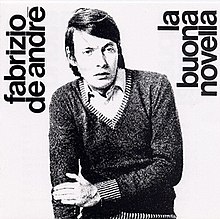La buona novella
| La buona novella | ||||
|---|---|---|---|---|
 |
||||
| Studio album by Fabrizio De André | ||||
| Released | November 1970 | |||
| Recorded | 1970 | |||
| Genre | Folk | |||
| Length | 35:27 | |||
| Language | Italian, Latin | |||
| Label | Produttori Associati | |||
| Producer | Roberto Dané | |||
| Fabrizio De André chronology | ||||
|
||||
| Alternative cover | ||||

Alternative cover of the original release
|
||||
| Professional ratings | |
|---|---|
| Review scores | |
| Source | Rating |
| Allmusic | |
La buona novella is the name of the fourth studio album by Italian singer-songwriter Fabrizio De André, released in 1970. Its plot revolves around the New Testament apocrypha.
The LP is a concept album inspired by several apocryphal gospels, mainly the Gospel of James and the Arabic Infancy Gospel.
Producer Roberto Dané had the original idea for the album and submitted it to Antonio Casetta of Produttori Associati, who in turn advised him to discuss the idea with De André, who was stuck in a creative rut at that time. After a year of work, the album was ready.
Narration in this album, in accordance with the apocrypha, emphasizes the human traits of traditional biblical characters (i.e. Joseph) and focuses more on some minor characters (i.e. Titus and Dumachus, the two thieves crucified along with Jesus). De André himself considered it "one of his best works, if not the best".
All tracks written by Fabrizio De André, except where noted.
The short opener "Laudate dominum" ("Praise the Lord") introduces to the first song, which is about Mary's childhood.
Mary is taken away from her mother at the age of 3 and lives a segregated existence in a temple until, at age 12, she is banished by the priests when "her virginity is tinged with red", making her unpure. Afterwards, a search is organized among the unwed to find a man for the child to marry, regardless of her will, effectively "making a lottery out of a virgin's body".
The chosen man is Joseph, an old carpenter, who is saddened by the decision, deeming that Mary has been given in marriage to "a too-old heart that is already resting".
Nevertheless, the carpenter takes his newly-wed bride to his home, and subsequently leaves to attend works outside of Judea.
...
Wikipedia
